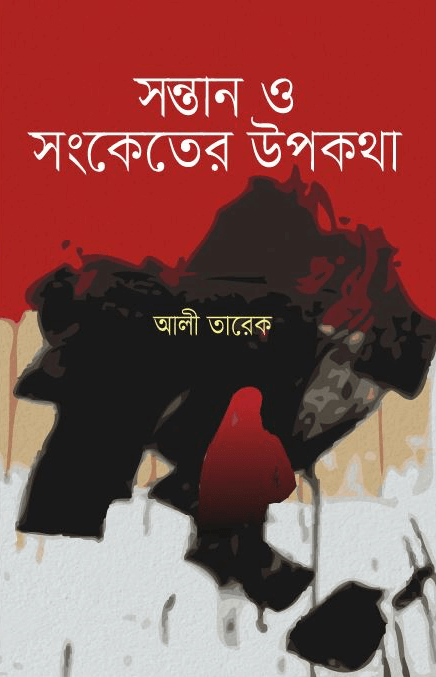সন্তান ও সংকেতের উপকথা

Sontan o Sonketer Upokotha by Ali Tareque is an eclectic short story collection of nine stories. Even though the stories are widely diverse in terms of points of view, genre, and the character, class and the vocation of their protagonists, they are all rich in their delectably distinct subtexts, and allegorical and emotional overtures. One thread that ties them together, except for one story, is death–in different forms and metaphorical undertones. Eight of these stories were originally written in English, and later translated into Bengali by the author himself.
The first story “Baashi” (The flute), written in alternative points of view of a severely wounded dog incapacitated to feed it’s fresh litter of puppies and a ten years old girl, weaves a complex but emotionally intense tale of how empathy, love and motherly instinct is brutally subjugated by the unforgiving apathy of life. It’s the only story of the book originally written in Bengali.
Read More
“Mrityu o Sotyo Mithyar golpo” (The story of death, truth and lies) is a story full of surprising twists and turns both in terms of the events as well as the points of views, which switches from the narrator to the writer and then from the detachment of the storyteller to his landing right in the middle of the happenings, questioning the narrative truthfulness of all the characters of the story–the author not excluded.
The story “Ador” (The Caress) starts with a cleric discovering himself talking to himself about his wife Salma whom he has just murdered. Through little things that he discerns in his deceased wife’s body that is swiftly catching rigor mortis, he remembers nuggets of his marital life with Salma. The snapshots, even though initially look like random flashbacks of his moral dilemmas and their conjugal ups and downs, eventually conjures a coherent picture of what really led him to murder his beloved wife.
“Gorvopat” (The Miscarriage) is written alternately from the point of view of a three year old girl Lizzie, who isn’t what she seems to be, and her writer father who struggles to start a story, whose wife is experiencing complications giving birth to a child. The very subtle nuances in the relationship between the parents and two children, one yet to be born, leads the reader to a terminus that spawns emotions of surprising contrast.
“Jhaap” (The plunge) is story of a performing artist who is displaying an act of acrobacy, jumping and gyrating in the air in front of a motley crowd, and while at it, connects all the little vistas he catches around his twirling body to the pieces of fateful events of his life that has led him to this day with a ticking calamity awaiting his reaching the ground. As his distracted mind imposes a dreadful uncertainty on his safe landing, it also allegorizes the ominous incertitude that awaits the person who matters most to his life.
“U-turn” (The U-turn) breaches the rather morbid ennui of rest of the stories of this collection with a quite contrastingly jovial and right in-the-face-of-life story of a middle-aged woman’s in-a-blink-of-an-eye foray to a plausible romantic encounter and a swift return to a not-so-promising take of the transpiring event, as she trots down a bookstore aisle marking “J” and takes an U-turn to the next aisle, “I” or “K”, of which she cannot be sure, in the brief expanse of her brisk adventure.
“Khuni” (The Hitman) is a psychological suspense thriller where a person trying to hire a hitman starts questioning the lack of moral questions and introspection in a hired assassin and ends up finding some answers in a very unexpected and fatal way–the path of which is wonderfully allegorized by the protagonist’s long journey to this middle of nowhere place–both in time and in action.
“Harem” (The Harem) is a story of revenge fantasy that transposes the point of view on its head and treads a dangerously beautiful path of perfidious love.
“Sontan o Sonketer Upokotha” (The Fable of Offspring and Symbol), is the last and the eponymous story of the book. Set in a timeless, fabulous, agrarian habitat, this story is teemed with symbolisms, and through an impalpably subtle and almost magic-realistic and humane narrative provokes a flurry of profound thoughts.
The short story collection Sontan o Sonketer Upokotha is a fascinating journey with full of surprises and with some dangerously delectable twists and turns into tales that sometimes pictures a wholesome picture of the intricate subtleties of life, sometimes poses questions that leaves the reader pondering and in the end, a multitude of senses, both sensual and cerebral, are piqued, stimulated, and left gratifyingly lingering.